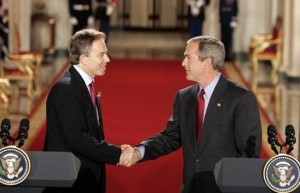This piece was reprinted by OpEd News with permission or license. It may not be reproduced in any form without permission or license from the source.
This article cross-posted from Consortium NewsCo-authored by Annie Machon*

British Prime Minister Tony Blair and U.S. President George W. Bush shake hands after a joint White House press conference on Nov. 12, 2004. (White House photo by Paul Morse)
Recent remarks by Sir John Sawers, who heads Britain's MI6 (the Secret Intelligence Service that is Britain's CIA counterpart), leave us wondering if Sawers is preparing to "fix" intelligence on Iran, as his immediate predecessor, Sir John Scarlett, did on Iraq.
Scarlett's pre-Iraq war role in creating "dodgy dossiers" hyping the threat of non-existent "weapons of mass destruction" is relatively well known. On July 4, the red warning light for politicization was again flashing brightly in London, as Sawers told British senior civil servants that Iran is "two years away" from becoming a "nuclear weapons state." How did Sawers come up with "two years?"
Since late 2007, the benchmark for weighing Iran's nuclear program has been the unanimous assessment by all 16 U.S. intelligence agencies that Iran halted its nuclear weapons program in late 2003 and that, as of mid-2007, had not restarted it. Those judgments have been revalidated every year since, despite strong pressure to bow to more ominous -- but evidence-starved -- assessments by Israel and its neo-conservative supporters.
The 2007 U.S. National Intelligence Estimate helped thwart plans to attack Iran in 2008, the last year of the Bush/Cheney administration. This shines through in George Bush's own memoir, Decision Points, in which he rues the NIE's "eye-popping declaration: "We judge with high confidence that in fall 2003, Tehran halted its nuclear weapons program.'"
Bush continues, "But after the NIE, how could I possibly explain using the military to destroy the nuclear facilities of a country the intelligence community said had no active nuclear weapons program?" (Decision Points, p. 419)
Hands tied on the military side, U.S. covert operations flowered, with $400 million appropriated at that same time for a major escalation of the dark-side struggle against Iran, according to military, intelligence, and congressional sources cited by Seymour Hersh in 2008.
The clandestine but all-too-real war on Iran has included attacks with computer viruses, the murders of Iranian scientists, and what the Israelis call the "unnatural" demise of senior officials like Revolutionary Guards Major General Hassan Moghaddam, father of Iran's missile program.
Moghaddam was killed in a large explosion last November, with Time magazine citing a "western intelligence source" as saying the Israel's Mossad was behind the blast. More threatening still to Iran are the severe economic sanctions laid upon it, sanctions which are tantamount to an act of war.
Israeli Prime Minister Benjamin Netanyahu and pro-Israel neo-conservatives in the U.S. and elsewhere have been pushing hard for an attack on Iran, seizing every pretext they can find. Netanyahu was suspiciously fast off the blocks, for example, in claiming that Iran was behind the tragic terrorist bombing of Israeli tourists in Bulgaria on July 18, despite Bulgarian authorities and even the White House warning that it is too early to attribute responsibility.
Netanyahu's instant indictment of Iran strongly suggests he is looking for excuses to up the ante. With the Persian Gulf looking like an accident waiting to happen, stocked as it is with warships from the U.S., the U.K. and elsewhere -- and with no fail-safe way of communicating with Iranian naval commanders -- an escalation-generating accident or provocation is now more likely than ever.
July 23, a Day of Infamy
Oddly, Sawers's speech of July 4 came just as an important date approached -- the tenth anniversary of a sad day for British and U.S. intelligence on Iraq. On July 23, 2002 at a meeting at 10 Downing Street, then-MI6 head, John Dearlove, briefed Prime Minister Tony Blair and other senior officials on his talks with his American counterpart, CIA Director George Tenet, in Washington three days before.
In the official minutes of that briefing (now known as the Downing Street Memo), which were leaked to the London Times and published on May 1, 2005, Dearlove explains that George Bush has decided to attack Iraq and the war was to be "justified by the conjunction of terrorism and weapons of mass destruction."
When then-Foreign Secretary Jack Straw points out that the case was "thin," Dearlove explains matter-of-factly, "The intelligence and facts are being fixed around the policy."
There is no sign in the minutes that anyone hiccupped -- much less demurred -- at making a case for war and furthering Blair's determination to join Bush in launching the kind of "war of aggression" outlawed by the Nuremberg Tribunal after World War II and by the United Nations Charter.
(Note: You can view every article as one long page if you sign up as an Advocate Member, or higher).





